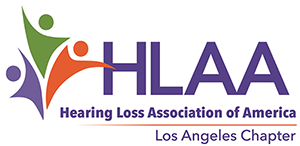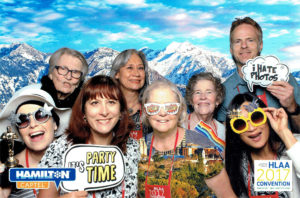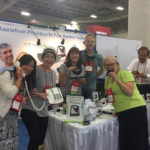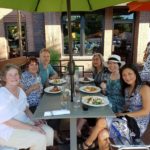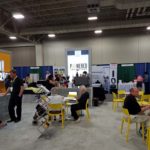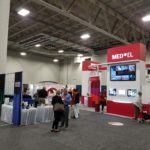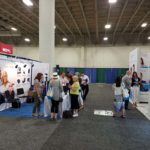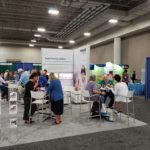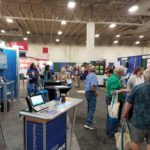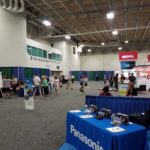HLAA 2017 Convention – Last Full Day
Well, it’s the last full day of the convention but filled with sessions, workshops and memory overload. After some breakfast, I yonder over to the train and head into the convention to start the first of five sessions.
(our very own Tim Browning chronicles his continuing journey at the HLAA 2017 Convention. Here’s his recap for day 3 of the Convention.)
The first session, “The Art of Self-Accommodation” by Jason P. Anderson, counselor for the deaf and hard of hearing at the University of Wisconsin-Milwaukee, is a very engaging story about the struggles and challenges for Jason. Jason became ill at 1.5 years old and lost all his hearing in his left ear. Struggling in a world of isolation, his teachers discounted his abilities to learn but thanks to his parents who advocated for him, he made it through school. His story continues with losing the rest of his hearing in his right ear at age 22. Discriminated and angry, he took a leap of faith and went to college where he learn his counselor was deaf as well. First the first time in his life, someone understood him. Moral of the story is, don’t feel sorry for yourself, get angry or build walls, find acceptance and advocate!
I head over to the next session, “Career Success After Hearing Loss: Finding and Refining Your Path” by David C. Baldridge, Ph.D. from Oregon State University. The focus is on finding career success after hearing loss. It’s important to understand your environment for success and the types of jobs, tasks, and organizational contexts where people with hearing loss are more likely to be successful. David is very passionate on this subject so there is much more to share beyond the scope of this article. He has already reached out to me for my own experiences and challenges at work.
Nature is calling so after that “break”, I head over to the last session for the morning, “Integrating Into the Community: What Can We Do to Make a Difference at Scale?” by Russell Misheloff, President of the Washington D.C. chapter. Interesting session noting how only 1 out of every 9600 individuals with hearing loss is part of the HLAA membership! We are not reaching people at scale! There are many opportunities to broaden our reach, including reaching out to those with HOH family members for help. Much of the discussion was about building a core group of individuals to represent the HOH community to various community groups, organizations (private and public) and events. Through this, a great start can be achieved to reach and help more in need. You and I both know there are many people out there!
A two-hour break ensues so a planned formal group shot is done just to prove we really did attend. It’s all good fun but I realize it might have been better to plan this kind of a break earlier during the convention because all the exhibits are closing by 3pm. I missed most of this but hopefully the other attendees can share what they learned. I will probably attend the tech expo in Torrance in September. Looking at the formal photo again, I’m pondering just who are these people?
Lunch is next at the stairway (we were disappointed there wasn’t readily available sitting spots to eat!). After I finish and lift my sore read-end from the steps, I head over to the “Reducing Emotional Reactions to Difficult Listening Situations” session by Samuel Trychin, Ph.D. Samuel is a popular speaker and the room is packed. Many good tidbits of information were provided. This included the negative impact of hearing stress on your cognitive function (what we practice doesn’t work), how exhaustive listening is (that’s why we are tired all the time) and smile! Smile creates natural chemistry changes in your brain to make you happier and those around you perk up! Very informative session and I was smiling!
Final session is “Assisting Individuals Who Experience Listening Fatigue” by Susan R. Naidu, Ph.D. The session focused on fatigue and the brain. A fifth of the people with hearing loss will quit their job due to frustration and brain fatigue. Trying to focus and understand forces your frontal cortex to work harder which means more cognitive energy (fatigue). And don’t forget adverse listening conditions, such as background noise. This makes it even worse! Aural rehabilitation was then discussed as a new way to do exercises to use memory and sequencing skills to build up your cognitive abilities and endurance. This is expanding so you are bound to hear more about this development.
Speaking of brain fatigue, with so much information, I begin to wonder where I am and if I have a brain anymore. Pretty exhausting so I head back to rest and meet up with the others for dinner. Upon seeing everyone else, I can tell it’s been a long but informative day and it’s great to see everyone.
Tomorrow is the Mormon Tabernacle which should be a very interesting experience before saying our goodbyes to head home. I wonder what the sound quality will be like? More to come…!
- What are you eating Nanci?
- Grabbing some dinner and good conversation after the day
- Exhibit Hall
- Exhibit Hall – What I had time to see
- Gang talking with Teri as she manages her booth
- Phonak’s booth
- Hamilton CapTel booth
- Entry into the Exhibit Hall
